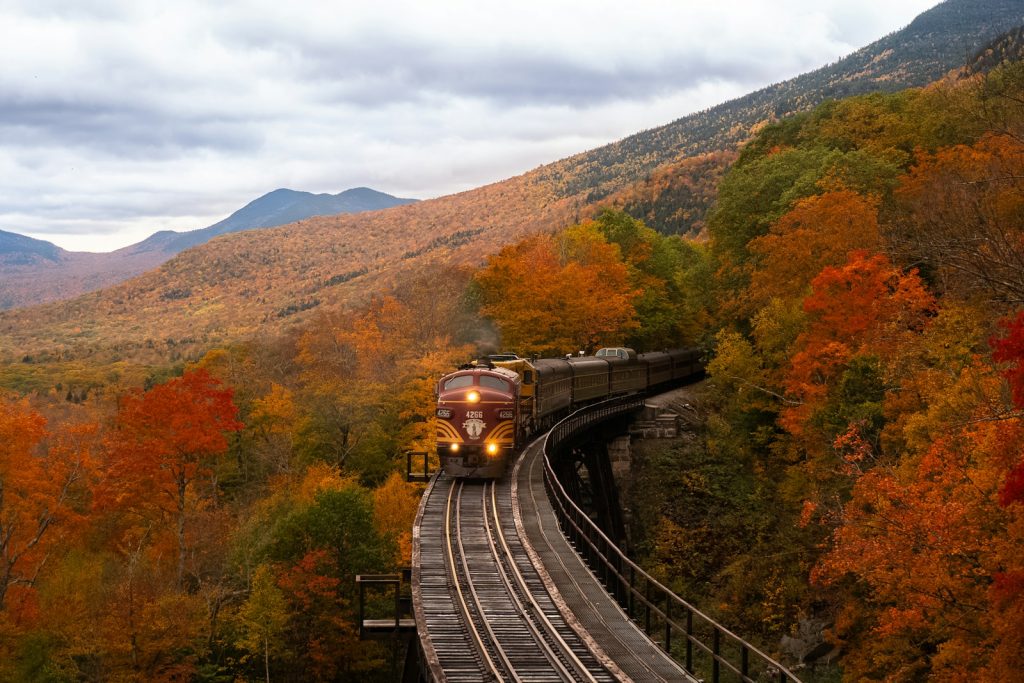20 Things You Should Know About New Hampshire

New Hampshire, a small but historically significant state in New England, is often associated with its rugged landscapes, independent spirit, and pivotal role in U.S. presidential politics. From its quaint towns and scenic mountains to its rich history and vibrant outdoor culture, New Hampshire offers much to explore. As the first state to hold a primary election during U.S. presidential races and a place known for its natural beauty, New Hampshire is full of unique features that make it stand out. Below are 20 things you should know about New Hampshire.
1. The Granite State: A Symbol of Strength and Independence
New Hampshire’s nickname, The Granite State, stems from its extensive granite formations, which have been historically important for quarrying and construction. Granite is seen as a symbol of strength and stability, qualities that reflect the state’s ethos. Today, the granite quarries are less active, but granite remains a symbol of New Hampshire’s rugged landscape and independent spirit.
The state’s strong sense of independence is also reflected in its famous motto: “Live Free or Die.” This motto, adopted in 1945, was inspired by a statement made by Revolutionary War hero General John Stark and continues to define the state’s philosophy of personal freedom and limited government intervention.
2. No Sales or Income Tax
One of New Hampshire’s biggest draws is its lack of state sales or income tax. This has earned the state a reputation as a haven for those seeking a low-tax lifestyle. The absence of these taxes has made New Hampshire particularly attractive to retirees, businesses, and people from neighboring states like Massachusetts, where taxes are higher.
However, the state does rely on property taxes, which are among the highest in the country. Despite this, the overall tax burden is relatively low, and the state’s commitment to individual financial freedom aligns with its independent spirit.
3. First in the Nation Primary: A Political Hotbed
New Hampshire plays a critical role in U.S. politics as the home of the First in the Nation Primary. Every four years, New Hampshire holds the first primary election in the country, which often sets the tone for the rest of the presidential race. Candidates spend significant time in the state, and voters in New Hampshire are known for their civic engagement and careful consideration of the candidates.
The primary has given New Hampshire an outsized influence on national politics, making it a must-visit for candidates from both parties. The primary has been a key battleground for presidential hopefuls since 1920, and its results often help shape the media narrative for the rest of the election season.
4. Mount Washington: Home to Some of the World’s Wildest Weather
Mount Washington, located in the White Mountains, is known for having some of the most extreme weather on the planet. Standing at 6,288 feet, it is the highest peak in the northeastern United States and is infamous for its hurricane-force winds. In fact, the Mount Washington Observatory recorded a wind speed of 231 mph in 1934, which stood as the world record for over 60 years.
The mountain attracts adventurers, hikers, and scientists alike. The Mount Washington Auto Road and the Cog Railway offer access to the summit, providing breathtaking views of the surrounding landscape. The summit also offers a museum and weather station that educate visitors about the mountain’s unique climate.
5. The White Mountains: A Natural Playground
The White Mountains are one of New Hampshire’s most prominent natural features and a popular destination for outdoor enthusiasts. The region offers hiking, skiing, and camping opportunities for people of all skill levels. The Appalachian Trail runs through this range, providing scenic and challenging hikes, including the Presidential Range, which consists of peaks named after U.S. presidents, including Mount Washington.
During the fall, the White Mountains are renowned for their vibrant foliage, attracting visitors from across the country. Franconia Notch State Park and Crawford Notch are two of the many popular areas within the White Mountains, known for their stunning vistas, waterfalls, and outdoor recreational activities.
6. Lake Winnipesaukee: The Largest Lake in New Hampshire
Lake Winnipesaukee, New Hampshire’s largest lake, is a centerpiece of the state’s lakes region and a favorite destination for both residents and tourists. The lake covers approximately 72 square miles and has over 250 islands, offering opportunities for boating, fishing, swimming, and other water activities. The lake is surrounded by charming towns like Meredith, Wolfeboro, and Laconia, which offer dining, shopping, and year-round activities.
In the summer, Lake Winnipesaukee is a bustling hub for tourism, and in the winter, it transforms into a haven for ice fishing, snowmobiling, and other winter sports. The annual Ice-Out on Lake Winnipesaukee, when the lake thaws enough for boats to move freely, is a much-anticipated event that signals the arrival of spring.
7. Portsmouth: A Historic Coastal Gem
Situated on the coast, Portsmouth is one of New Hampshire’s oldest cities and boasts a rich history dating back to the 1600s. The city was once a major shipbuilding center, and its historic downtown still reflects the maritime heritage of the region. Visitors can explore Strawbery Banke Museum, an outdoor history museum with restored homes and buildings that date back to Portsmouth’s early colonial days.
Portsmouth also has a vibrant arts and cultural scene, with theaters, art galleries, and numerous festivals throughout the year. The Prescott Park Arts Festival is one of the city’s most beloved events, offering free outdoor concerts and theater productions during the summer. Portsmouth’s walkable streets, colonial architecture, and thriving dining scene make it one of New Hampshire’s most charming cities.
8. Abolitionist History: The Underground Railroad in New Hampshire
New Hampshire played a key role in the abolitionist movement and the fight to end slavery in the United States. The state was home to several Underground Railroad stops, where abolitionists helped enslaved people escape to freedom in Canada. Towns like Canterbury and Dover were significant in this movement, offering refuge and assistance to those fleeing slavery.
The state’s abolitionist history is commemorated at various historical sites and museums. The Portsmouth Black Heritage Trail highlights the contributions of African Americans to the city’s history, including their role in the Underground Railroad.
9. The Old Man of the Mountain: A Beloved State Symbol
For many years, the Old Man of the Mountain was one of New Hampshire’s most iconic landmarks. This natural rock formation, located on Cannon Mountain in Franconia Notch, resembled a profile of an old man’s face and became a symbol of the state’s rugged beauty and resilience.
Unfortunately, the Old Man of the Mountain collapsed in 2003, but its legacy lives on. A memorial and visitors center at Franconia Notch allows people to see what the formation once looked like and reflects New Hampshire’s pride in this unique natural wonder.
10. The Seacoast: New Hampshire’s Gateway to the Atlantic
Though New Hampshire has only 18 miles of coastline, it makes the most of its seacoast with picturesque towns, sandy beaches, and historical sites. Hampton Beach is a popular destination for tourists, offering a wide stretch of sandy beach, boardwalk attractions, and summer concerts.
The coastal city of Portsmouth serves as the heart of New Hampshire’s seacoast, while smaller towns like Rye and New Castle offer quieter coastal retreats. The Seacoast Science Center in Rye provides educational programs and exhibits focused on the marine environment and coastal ecosystems.
11. Fall Foliage: One of the Best Places for Leaf Peeping
New Hampshire is famous for its fall foliage, drawing thousands of visitors each year to experience the vibrant colors of autumn. The state’s forests come alive with brilliant hues of red, orange, and yellow during the fall, with the peak foliage season typically occurring in late September to mid-October.
Some of the best places to experience fall foliage include the Kancamagus Highway, a scenic 34-mile stretch through the White Mountain National Forest, and Franconia Notch, where visitors can enjoy leaf-peeping along the many hiking trails or from the Cannon Mountain Aerial Tramway.
12. Maple Syrup: A Sweet New Hampshire Tradition
New Hampshire is one of the top producers of maple syrup in the United States. Maple sugaring season takes place in late winter and early spring when the sap begins to flow in the state’s sugar maple trees. During this time, local sugar houses boil the sap down to produce the sweet syrup that is a staple of New England cuisine.
Many sugar houses in New Hampshire offer tours and tastings during the sugaring season, giving visitors a firsthand look at the traditional process of making maple syrup. The annual New Hampshire Maple Weekend allows people to visit sugar houses, sample fresh syrup, and learn about the state’s long-standing sugaring traditions.
13. State Parks and Hiking Trails: Nature’s Playground
New Hampshire is home to a wide array of state parks that offer a wealth of recreational opportunities year-round. From the towering peaks of Mount Monadnock to the tranquil shores of Pawtuckaway Lake, the state parks provide spaces for hiking, fishing, camping, and more.
One of the most famous
hiking spots in New Hampshire is Mount Monadnock, often cited as one of the most climbed mountains in the world. Its relatively easy ascent and panoramic views from the summit make it a favorite for both locals and tourists. The state is also part of the Appalachian Trail, attracting hikers from around the globe who come to experience the wilderness and beauty of New Hampshire’s terrain.
14. A Hub for Winter Sports
Winter is a time of great activity in New Hampshire, with the state becoming a hub for winter sports enthusiasts. The White Mountains are home to several ski resorts, including Cannon Mountain, Loon Mountain, Waterville Valley, and Bretton Woods. These resorts offer some of the best skiing and snowboarding in the eastern United States.
Beyond skiing, New Hampshire is also a popular destination for snowmobiling, ice fishing, snowshoeing, and cross-country skiing. The state’s extensive network of snowmobile trails makes it a top destination for winter recreation.
15. America’s Stonehenge: A Mysterious Historical Site
America’s Stonehenge, located in Salem, New Hampshire, is one of the state’s most enigmatic historical landmarks. This ancient site consists of a complex of large stone structures and arrangements that some believe date back thousands of years. The origins and purpose of the site remain a mystery, with theories ranging from Native American construction to pre-Columbian European settlers.
Visitors to America’s Stonehenge can explore the stone structures, learn about the various theories surrounding their origin, and experience the site’s tranquil setting in the New Hampshire woods.
16. New Hampshire Motor Speedway: A NASCAR Favorite
For racing enthusiasts, the New Hampshire Motor Speedway in Loudon is a must-visit destination. The speedway hosts major NASCAR events, including the annual NASCAR Cup Series race. The 1.058-mile oval track is one of the premier motorsports venues in the Northeast and attracts thousands of fans each year.
In addition to NASCAR, the speedway hosts other racing events, including motorcycle and sports car racing. The venue also offers driving experiences, where fans can get behind the wheel of a race car and experience the thrill of high-speed driving on the track.
17. Colleges and Universities: Home to Ivy League and Prestigious Schools
New Hampshire is home to several prestigious colleges and universities, including Dartmouth College, an Ivy League institution located in Hanover. Founded in 1769, Dartmouth is one of the oldest universities in the United States and is known for its rigorous academic programs and strong emphasis on undergraduate education.
Other notable institutions include the University of New Hampshire in Durham, the state’s flagship public university, which is known for its research programs, particularly in marine biology and environmental sciences. New Hampshire’s universities contribute to the state’s intellectual and cultural life, drawing students from across the country and around the world.
18. Tax-Free Shopping: A Shopper’s Paradise
Thanks to New Hampshire’s lack of a state sales tax, the state is a popular destination for shoppers looking to save money on goods. Visitors from neighboring states, especially Massachusetts, often flock to New Hampshire’s shopping centers and outlets to take advantage of the tax-free shopping.
Popular shopping destinations include the Merrimack Premium Outlets, the Mall of New Hampshire in Manchester, and the Kittery Outlets just across the border in Maine. The lack of sales tax extends to goods such as clothing, electronics, and other retail items, making New Hampshire a go-to state for bargain hunters.
19. The State House: The Oldest Continuously Used State Capitol
New Hampshire’s State House in Concord holds the distinction of being the oldest state capitol in the United States that is still in use by the legislature. Built in 1819, the State House features a gold-domed roof and is open to the public for tours. The building houses the New Hampshire General Court, the state’s legislative body, as well as the offices of the Governor.
The State House is a symbol of New Hampshire’s long history of self-governance and civic responsibility. Visitors can tour the building, explore its historical exhibits, and observe the legislative process in action.
20. Independence and Libertarian Ideals
New Hampshire has long been associated with a strong sense of independence and libertarian values. The state’s motto, “Live Free or Die,” embodies this spirit. New Hampshire residents tend to favor minimal government intervention in both their personal lives and economic matters, which is reflected in the state’s lack of income tax, sales tax, and relatively low regulation.
The state has also become a hub for the Free State Project, a political movement that encourages libertarians to move to New Hampshire to advocate for smaller government, lower taxes, and greater individual freedoms. This movement has attracted thousands of new residents to the state, further cementing New Hampshire’s reputation as a stronghold of political independence.
Conclusion
New Hampshire may be small in size, but it is rich in history, natural beauty, and political significance. From its scenic White Mountains and vibrant fall foliage to its pivotal role in U.S. presidential primaries, New Hampshire is a state that embodies the spirit of independence and offers a wide range of experiences for residents and visitors alike. Whether you’re exploring its outdoor recreational opportunities, delving into its abolitionist history, or taking advantage of its tax-free shopping, New Hampshire offers something for everyone.



